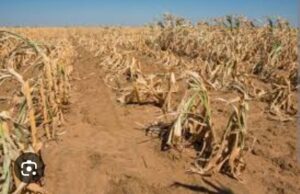


Photo credit: Wikipedia.
,,,,,Government Farmers Call for Rain, Explore Solar Irrigation Solutions.
The Government of Kogi State and the All Farmers Association of Nigeria (AFAN) have urgently called for prayers for rainfall due to severe drought impacting farm crops and food security in the region.
In an interview with the News Agency of Nigeria (NAN) in Lokoja, Commissioner for Agriculture, Mr. Timothy Ojomah, and AFAN Chairman, Salihu Adobayi, exercise fear over the crisis.
He said,“We are turning to prayers to seek divine intervention for rain in Kogi. Without rain, achieving our food production and security goals will be challenging.”
The commissioner noted with concern that drought, which has persisted for over a month, has severely affected crop production.“The drought is impacting our rice and maize farms, particularly those nearing maturity. The situation is dire,” Adobayi added.
Before the drought, farm prospects were promising. The government had allocated over 8,000 hectares for rice, maize, and cassava cultivation, all of which showed great potential until the drought struck.
The hope now lies in predictions from the Nigeria Meteorological Agency (NiMET) forecasting substantial rainfall starting August 18. If the rain comes, some crops might still be salvaged. However, continued drought would spell disaster for the crops, which depend heavily on water.
According to him, the state government is also considering a shift towards mechanized farming with a focus on solar-powered irrigation systems.
“Investing in solar water pumps could revolutionize farming in Kogi, enabling year-round cultivation and ensuring food security,”he added.
Adobayi noted that the drought has disrupted the government’s plans for farmers, with many crops nearing ruin. “We are fervently praying for rain to save our crops and mitigate the impact of the drought,” he said.
He expressed optimism that, with divine intervention and the introduction of solar water pumps, Kogi State could enhance its food production and security, overcoming current and future drought challenges.


